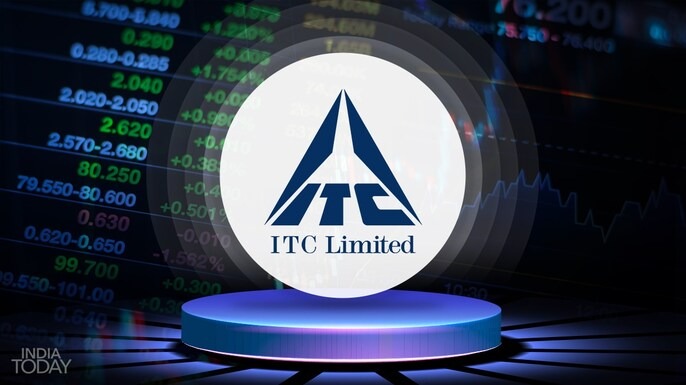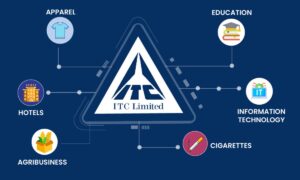Saiyaara Movie 2025 : A Heartfelt Dive into Love and Redemption
ITC Limited Share Prices 2025: Analysis and Insights
- Business
Ananya Saxena
- January 29, 2025
- 0

ITC Limited Share Prices
Table of Contents
ToggleCompany Overview
ITC Limited was founded in 1910 as the Imperial Tobacco Company of India Limited. Over the years, it has evolved into one of the country’s most diversified conglomerates. The company’s primary divisions include FMCG products like cigarettes (its oldest business line), packaged foods, personal care, and home care, along with a hospitality segment that operates several luxury hotels. Additionally, ITC has significant operations in paper, packaging, and agribusiness.
The company has gradually transformed into a diversified, non-tobacco-centric enterprise, with a substantial focus on the FMCG sector, which now contributes a major chunk to its revenue. ITC’s hospitality division operates a range of luxury hotels under the “ITC Hotels” brand, known for its high-end services and properties across India.

The growth in its FMCG portfolio, including popular brands like Aashirvaad, Sunfeast, Bingo, and Vivel, along with its continuous expansion of premium services, has positioned ITC as one of the most significant companies in the Indian market.
The ITC Share Price Surge: Key Drivers
The recent surge in ITC’s share prices, especially as it crossed the ₹1000 threshold, can be attributed to several factors:
1. Diversification Strategy
Historically, ITC’s dependence on its tobacco business was a major characteristic of its profile. However, over the past few decades, the company has pursued a deliberate strategy of diversification into non-tobacco sectors. This transformation has reduced its vulnerability to regulatory changes in the tobacco industry, which often face pressure from government policies. As ITC expanded its FMCG offerings, the stock began to attract attention from both institutional investors and retail investors alike. This diversification strategy allowed ITC to mitigate risks, and the resulting balance between its various segments created a sense of stability.
2. Strong FMCG Portfolio
ITC’s FMCG business has grown significantly in recent years, driven by its consumer brands in categories like packaged foods, personal care, and hygiene products. Aashirvaad, ITC’s flagship brand in the food segment, has witnessed strong demand, particularly with the increasing preference for packaged food products in India’s urbanizing markets. Sunfeast biscuits and cakes, as well as its other products, have also been well-received, with demand supported by evolving consumer tastes. The strong growth of its FMCG division has proven crucial to the stock’s upward trajectory.

ITC’s ability to rapidly scale its FMCG products across India and its increasing market share in sectors such as packaged foods and personal care has had a profound impact on its stock performance. Investors are often attracted to companies that show strong growth prospects, and ITC’s foray into these sectors has positioned it as a leader in the Indian FMCG industry.
3. Profitability and Return on Equity
ITC has consistently demonstrated impressive financial results. The company’s profitability has been strong, with robust margins, especially in its FMCG and hospitality segments. Investors often view a company’s return on equity (ROE) as an indicator of effective capital management and shareholder value creation. ITC’s high ROE has helped bolster investor confidence and contributed to the rising share prices.
4. Hospitality Business Resilience
The hospitality segment of ITC, which comprises luxury hotels, has also played an important role in its overall growth. Despite the COVID-19 pandemic severely impacting the hospitality sector worldwide, ITC Hotels demonstrated resilience. As the economy reopened, the hospitality business quickly recovered, thanks to a strong demand for both leisure and business travel in India. The luxury segment, in particular, experienced significant growth, with ITC hotels being recognized as some of the best in the country.
With India’s growing middle class and increasing disposable incomes, the hospitality industry is poised for long-term growth. As ITC has been able to strengthen its presence in this sector, its stock price has benefited from the positive sentiment surrounding the sector’s recovery.
5. Dividend Payouts and Stable Cash Flow
ITC has been known for its attractive dividend payout history, which makes it appealing to income-focused investors. The company’s ability to generate steady cash flows from its diverse businesses allows it to offer lucrative dividends to its shareholders. This consistency in payouts has earned ITC a loyal investor base, which in turn has contributed to the appreciation of its stock.

6. Macro-Economic Factors
The broader economic environment also plays a significant role in the performance of ITC’s stock. India’s economic growth, increasing consumption, and shifting consumer trends have all positively impacted ITC’s various business segments. The company has benefited from the growing demand for packaged foods, personal care products, and premium services, which have led to increased earnings and stock value.
Moreover, the increasing number of retail investors in India has amplified the demand for ITC shares. The stock is often seen as a relatively stable investment, which, combined with its strong dividend yield, has attracted long-term investors.
7. Investor Sentiment and Market Liquidity
The rise of ITC stock can also be attributed to changing investor sentiment in India’s stock market. As domestic and foreign institutional investors flock to well-established companies, ITC has emerged as a prominent choice. The stock’s liquidity, combined with its strong presence in several sectors, makes it a favored option for many market participants.

Challenges Facing ITC’s Growth
While ITC has experienced a significant surge in share price, there are still several challenges the company faces in sustaining this growth trajectory.
1. Regulatory Pressure on the Tobacco Business
ITC’s roots in the tobacco industry still pose risks to its business model. Despite efforts to diversify, the company remains significantly reliant on its cigarette business, which continues to face regulatory hurdles. The Indian government has imposed higher taxes on tobacco products and has periodically raised the legal age for purchasing cigarettes. Further regulatory restrictions on tobacco could impact ITC’s profitability, particularly in its core segment.
2. Competition in the FMCG Sector
The FMCG sector is highly competitive, with numerous established players such as Hindustan Unilever, Nestlé, and Dabur constantly challenging ITC’s market share. Though ITC has successfully built a portfolio of strong brands, maintaining its growth in a highly competitive environment requires continuous innovation and marketing efforts. Additionally, the rise of e-commerce and the changing retail landscape require companies like ITC to adapt rapidly to emerging trends in consumer behavior.
3. Cost Pressures in the Hospitality Industry
The hospitality industry, while recovering, is still dealing with the aftereffects of the COVID-19 pandemic. The fluctuating costs of raw materials, labor shortages, and international travel restrictions are challenges that may weigh down the profitability of ITC Hotels. The future performance of the hospitality business depends largely on the recovery of the tourism sector and sustained consumer demand for luxury experiences.

Future Outlook for ITC Share Prices
Given the strong fundamentals, diversified business model, and growth prospects of ITC, the company is well-positioned for future growth. The company’s push into high-margin FMCG products, the continued expansion of its hospitality business, and its focus on sustainable growth should continue to attract investor interest.
However, challenges in the tobacco industry, competition in FMCG, and potential cost pressures in hospitality must be monitored. That said, if ITC continues to execute its strategy effectively, the company could maintain its upward momentum, and the share prices may continue to appreciate.
The ₹1000 mark is symbolic of the company’s strong market performance, and if ITC is able to continue growing its non-tobacco sectors, it could potentially see its stock price break new records. Investors should remain cautious but optimistic, with close attention to any regulatory or market developments that could impact the company’s performance.

Conclusion
ITC’s share price crossing the ₹1000 mark is the result of a combination of factors including strong financial performance, a diverse business portfolio, and investor confidence. While the company faces challenges, it remains one of the most promising players in the Indian market. As ITC continues to innovate, diversify, and grow its presence in key sectors, its stock is likely to maintain its upward trajectory, provided the company navigates external challenges effectively. Investors should monitor the company’s financial performance, market trends, and regulatory landscape to assess future growth prospects.
ALSO READ THIS: Shreya Ghosal a Huge Sensation : A Journey Through Her Upcoming Concerts and Songs in 2025


